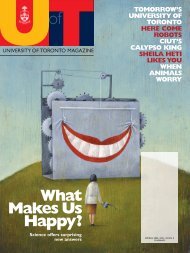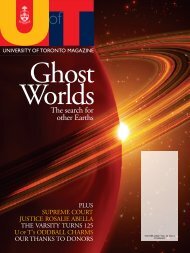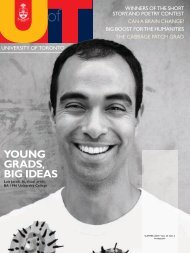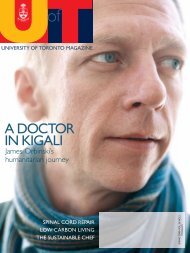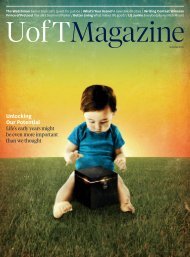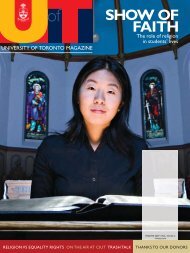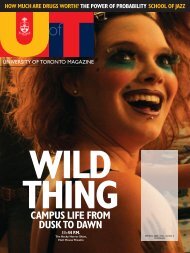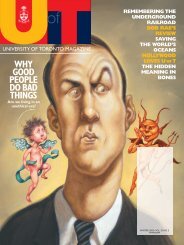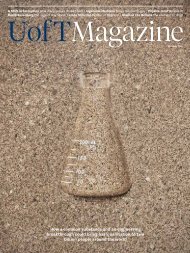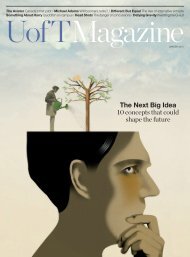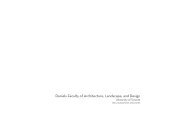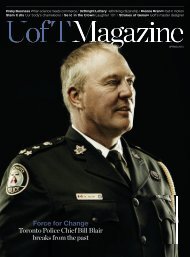says. The global economy naturally comes to mind, especiallyin advance <strong>of</strong> November’s G20 meeting in Seoul. Otherresearch questions, such as science policy, will be broached.And there will be an exchange <strong>of</strong> ideas on a wide variety <strong>of</strong>other global issues. This is important, says Stein, because“there are 100 million Mexicans. We’re focused rightly onIndia and China, but they’re halfway around the world andMexico’s right in our backyard.”The public is invariably invited to play a part in suchconferences; an acquaintance <strong>of</strong> Stein’s says these events<strong>of</strong>fer “a university education for free.” Lectures and debatesare sometimes televised, always streamed on the MunkSchool’s website and frequently sold out within minutes.Other gatherings include film screenings, book launches andtalks on topics ranging from folk religion to pharmaceuticalpolicy to the state <strong>of</strong> the euro; speakers come from all overthe world, finding instant audiences from every tile in theCanadian mosaic.“One <strong>of</strong> the reasons I was committed to public educationright from the word go is that I wanted a place where peoplefrom different communities can come and hear their owncountries talked about,” Stein says. She admits it isn’t alwayseasy. Campuses can be particularly fractious places. But Steinis “absolutely committed” to the idea <strong>of</strong> civil conversation, evenin the many cases where argument may be unavoidable.“There’s no value in shrieking at each other,” she says.“That’s not educational. We want questions and participationfrom the audience, but we don’t want harangues, speeches,personal attacks or insults. A university has a right to havehigher expectations.”There can be, however, no peace without security. And security,in myriad forms, will be a major focus in coming years.The $25-million federal commitment has been specificallyearmarked to establish the Canada Centre for GlobalSecurity Studies, which will position the Munk School as avital locus for policy generation on the issue.But what does security mean? Here is where the land masscrumbles further. In the coming decades, it will not be enoughto fortify our borders and airplanes and public buildings, norto concentrate exclusively on sabre-rattling from roguenations. At Munk, experts are looking beyond these problemsinto realms that are larger, more fluid, less subject to traditionalmethods <strong>of</strong> control: Water. Cyberspace. A previouslyforbidding Arctic that, because <strong>of</strong> climate change, is potentiallyopen to predation.“At evolutionary times such as these, the greatest challengeis for our understanding <strong>of</strong> the world to keep pace,” PrimeMinister Stephen Harper said earlier this year, in announcinghis government’s intention to fund the new centre. “TheMaking Canada HeardBenefactor Peter Munk hopes school will help transmit Canadian valuesaround the worldPeter Munk’s storied life has itself been aglobal affair. Born into a Jewish family inBudapest 82 years ago, he fled the Nazisin 1944 and made his way to Canada byway <strong>of</strong> Switzerland. After an early stint asan impoverished tobacco-picker, Munkearned a degree in electrical engineeringfrom U <strong>of</strong> T in 1952. His subsequent businesscareer led him to the $40-millionpurchase <strong>of</strong> Barrick Gold in 1983; it is nowthe world’s largest producer <strong>of</strong> the precious metal, with a marketcapitalization <strong>of</strong> $35 billion.Such wealth has enabled Munk to become what he calls a“focused philanthropist,” funding numerous causes that he ardentlybelieves in. One <strong>of</strong> these is the school that bears his name. “Iwanted to repay the U <strong>of</strong> T for taking me in as an immigrantstudent,” he says, speaking on the telephone (in true globalizedfashion), from a yacht <strong>of</strong>f the coast <strong>of</strong> Montenegro. “I spent fiveyears there; when I arrived I hardly spoke the language, but I leftas a total, absolute Canadian.”Though he has lived and worked in Canada for many years,Munk never takes Canadian values for granted − he knows all toowell that they are not universal. To his delight, however, “Canada isincreasingly being held up as a prime example <strong>of</strong> a country thatothers should emulate,” he says proudly. “From freedom <strong>of</strong> thepress, to our banking system, to policies on immigration, healthcare and education: for a whole bunch <strong>of</strong> reasons, Canada is nowgetting a chance to make its voice heard.” – Cynthia Macdonald[Munk School] has already earned a reputation for excellencein international security studies. Demonstrated successdeserves reinforcement.”The effect the school’s security initiatives have had on theworld outside is indeed worthy <strong>of</strong> note. Its Program on WaterIssues has long been examining concerns relating to the protection<strong>of</strong> Canadian water; director Adele Hurley has drafteda Model Act for Preserving Canada’s Water, the principles <strong>of</strong>which are supported by all major federal parties. In the comingyears, water may be a key focus <strong>of</strong> U.S.-Canada relations,as scarcity affects many areas south <strong>of</strong> the border and conflictscould arise, despite treaties designed to protect our ownership.Global climate change, the oil sands and energy use are alsokey areas <strong>of</strong> the school’s focus.Pr<strong>of</strong>essor Emeritus Franklyn Griffiths, an expert on Arcticsecurity affiliated with the Munk School, has provided policyanalysis and advice in this area to the federal government formore than 30 years. His advice may be more valuable thanever in the near future: Griffiths says the now-navigable Arcticis an area that, to date, has been well managed nationally36 WWW.MAGAZINE.UTORONTO.CA
“If you ask me why we have done as well as wehave over the decade, I think it’s the culturewe have created…. We have to make a place forexperimentation and innovation”but comparatively neglected in a global sense. “Through properstewardship, we can build greater security there,” he says,though problems could arise: further drilling under ice-coveredwaters, for example, could give rise to a “nightmare”scenario should a BP-style blowout ever occur. Shipping andterritorial disputes, as well as the well-being <strong>of</strong> aboriginalpeople living in the area, are also areas <strong>of</strong> concern.So far, though, the Munk School’s most prominent successon the security front has been realized by the Citizen Lab.Led by political scientist Ron Deibert, its small research teammonitors an Internet world that, as Deibert put it in a CBCreport, has been “carved up, colonized and militarized.” Thelab has developed s<strong>of</strong>tware to circumvent Internet censorshipin countries such as Iran and China. And in the past two yearsit has cracked two large cyber-espionage rings that allegedlyoriginated in China. Both rings were hacking into computersaround the world (the second ring focused on India) in orderto steal politically explosive information. The Citizen Lab iswithout question a world leader in this area, says Stein. “We’remaking a huge investment there,” she continues, saying thatnew funding will enable it to double in size.The Citizen Lab made global headlines for two studies inquick succession, but seven years <strong>of</strong> intensive work precededthe publicity. Stein says the Munk School’s “incubator atmosphere”can be nerve-racking, since she never knowswhether a project will succeed. “Most will not, and we haveto have the expectation that they will not,” she says. A projecton global public policy “didn’t attract enough interest andexcitement.” One on public space did not survive the initialinvestment, but Stein may go back to it, incorporating thework <strong>of</strong> architects and designers as well as political scientists.But “if you ask me why we’ve done as well as we have overthe decade, I think it’s the culture we have created,” which shesays is more accepting <strong>of</strong> risk than is usual in Canada. “Wehave to make a place for experimentation and innovation −and in order to do that, it has to be okay to fail.”Canadians’ natural aversion to risk may irk Stein. Otherwise,she says, her home and native land might just be the bestpossible place for a school <strong>of</strong> global affairs. “We are a developedcountry with a rich knowledge base, with excellentuniversities that are among the best in the world. But we don’thave an imperial past. You can’t say that about the UnitedStates, Britain, France, Germany, Holland, Portugal or Spain!Our slogan is ‘Join the Global Conversation’ − not ‘Lead…’”This conversation, naturally, is largely being conductedover the Internet. But although the school has accommodateditself to a cyber-dominant world, Stein also sees its teachingand research as a bulwark against the electronic realm’s errorsand superficialities. Today’s world may be saturated in information,she says, “but how do you know how well-researchedit is, how thoughtful it is? People want places where they canget some quality assurance. And that’s in a sense what theMunk School is – it’s a node <strong>of</strong> quality assurance.”And though Stein’s departure from the Munk School directorshipcan be seen on the horizon, she says it isn’t imminent.“The university will begin this fall to look for a successor.However long that process takes, I will stay until my successortakes over.” Until that happens, she will continue presidingover an institution that is diverse in perspectives, but unifiedby strong values. Brash, yet respectful. And forward-looking,even as it is deeply grounded in history. Tolerance, peace anddiversity may be distinctly Canadian virtues, but Stein knowstheir appeal transcends all borders. “I like working here,” shesays. “You can hear it in my voice, can’t you?”Cynthia Macdonald (BA 1986 St. Michael’s) is a writer in <strong>Toronto</strong>.autumn 2010 37



